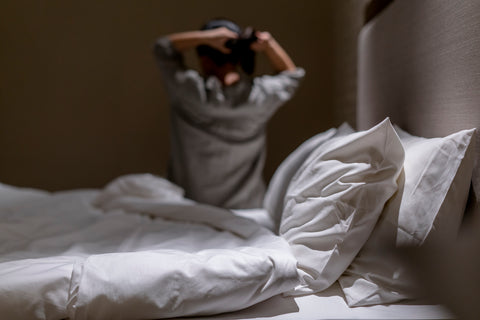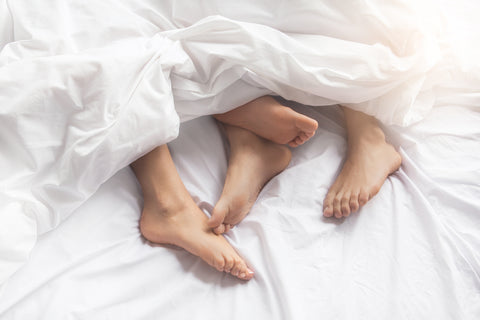What is Sleep Hygiene? Hint: It's not just showering before bed

Take a look at the sleepy zombies standing in line at your local coffee shop in the morning, and you’ll see what research already confirms: we have a serious sleep deprivation problem.
In fact, a new report shows that more than a quarter of Canadians get fewer than seven hours of sleep a night. The equivalent of almost 10 million working hours are lost every year in the U.S due to employees who are too tired to work efficiently. Worldwide, more than half (51%) of all adults report they get less sleep than they need on an average night, and 80% say they’re using weekends to make up for sleep lost during the week.
It’s clear we’re facing a worldwide sleep deprivation epidemic. But why? What are the culprits causing us to skip snooze town and experience daytime sleepiness? And, how can you ensure quality sleep at night and alertness during the day?
One answer may be practising better sleep hygiene — a holistic approach to improving shut-eye that involves taking simple steps throughout your day to make it easier to fall asleep at night.
What is sleep hygiene?
Just like oral hygiene is a habit, the idea of sleep hygiene is to routinize the lead-up to getting good zzz’s. Put simply, sleep hygiene is the habits that help you have a good night’s sleep. Turns out, you can dramatically improve your sleep quality by making a few minor adjustments to your lifestyle.
Here’s our completely holistic guide to improving your sleep hygiene, so you can stop hating your morning wake-up and feel more energized throughout the day!
5 simple ways to improve your sleep hygiene habits:
Step 1: Start tracking your sleeping patterns
If you’re going to change your habits to ensure you get enough sleep, it’s helpful to start by knowing exactly how many hours you’re getting and how long it takes you to nod off.
For example, you might think you’re getting 8 hours of sleep a night, but what if you’re only getting 7? Instead of guessing how many hours you're getting or wondering if you got enough deep sleep, you can get hard data by tracking your sleeping patterns.
Using a sleep tracker app, a wearable device that monitors your heart rate and movement (like a Fitbit), a smart bed, or an analogue sleep diary can help you follow a set sleeping schedule and track your sleeping behaviour.

Step 2: Keep your sheets clean
Dead skin, dirt, street grime, makeup, dust mites, fecal matter, oh my!
Your bed is one of the last places you want to think of as dirty — after all, it’s where you retreat to at the end of the day, burrowing in like a blanket burrito to get as comfy as possible.
However, new research shows that your bed is way, way dirtier than you might think. We’re constantly shedding dead skin cells, oozing skin oils, and secreting sweat onto our sheets. Relaxing on your bed wearing dirty clothes (like when you’re reading a book or scrolling on your phone), can transfer bacteria onto your bedding, which can survive for weeks or even months.
DID YOU KNOW?
After just one week, your pillow may contain
over 17 thousand times more bacteria than your toilet seat.
Just think about where your clothes have been — bus seats, bar stools, public benches, bathroom floors. And, don’t even get us started on suitcases and pets; they've been on countless floors and other suspect surfaces. Eeek! Are you ready for a shower yet?
To make sure you aren’t snuggling with all kinds of nasty bacteria that can cause sickness and disrupt your sleep, try to clean your sheets and pillowcases at least once a week.
Step 3: Follow a bedtime routine
Did you know following the same bedtime routine each night psychologically trains your brain to recognize it’s time for bed? A well-planned evening routine can make a huge difference in the quality of your sleep.
The goal of your evening routine should be to wind your mind and body down to promote deeper rest and relaxation. Some activities you might like to include in your routine 30-60 minutes before bed are:
- Taking a warm shower or bath
- Drinking sleepy herbal tea
- Aromatherapy
- Journalling, drawing or colouring in
- Pampering yourself (e.g. face mask, foot soak, hand massage, etc.)
- Meditation or visualisation
- Restorative yoga
- Reading a book
Step 4: Limit sleep disruptors
Everyone knows that drinking coffee after a certain hour can keep you awake, but the connection between what we eat and how we sleep goes a lot deeper than your 6pm latte. Too much sugar, alcohol, water, high-fat or high-protein foods, heavy meals, and spicy foods can all impact your ticket to slumberland.
On the flipside, nutritional deficiencies can also sabotage your sleep. Studies show that being low in vitamin D, vitamin B12, magnesium and iron can cause insomnia and sleeping troubles. A nutritious diet supports higher-quality sleep. So if you want to sleep better, eat better! 
Step 5: Pay attention to light and darkness
Light is a powerful cue to stay awake and serves as one of the major regulators of your circadian rhythm. It might seem counterintuitive, but a daily dose of bright sunshine can actually help you to sleep better.
Your brain relies on sunshine during the day to recognize when it’s time to be awake and alert. Then, when it’s time for sleep, your brain learns to associate the darkness that comes in the evening with falling asleep.
Issues arise can when you get the two mixed up. For example, if you work in a dark environment or spend a lot of time in low-light areas during the day, or you sleep in a room that’s got too much light. Try these sleep hygiene tips to support your natural circadian rhythm:
- Get an eye mask or blackout curtains if you live in a light-polluted area.
- Dim the lights in your house around an hour before bedtime.
- Expose yourself to bright natural light throughout the day, especially around the times that you wish to be most alert.
- Avoid screens, including smartphones, before bed.
- Swap bright lights for candles or fairy lights at night.
Did you enjoy this article? Discover more ways to improve your sleep on the HauteCoton blog and Instagram account!

